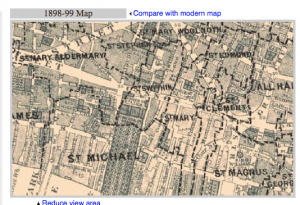
Cannon Street Station is a real landmark in London and it is near the river Thames and sits quietly near the middle of the area. The people that live in this vicinity are poor as reflected within the light blue symbols that are coordinated on the map. There are various reports within the Old Bailey of petty, simple, or grand larcenies, along with robberies, reports on murder, and various acts of deception, such as forgery. The railroad track connects to many different roads and streets in the precinct smack in the middle of the neighborhood. Surrounding St. Michaels, St. Mary’s, and St. Magnus, Cannon station street stands as the epicenter for all of the local churches. Seeing as it stands within an impoverish center, it was a high area of violence, robbery, and oppression as it was an area that was dominated by the poor and within that led to an opium den that happened to be located a few blocks over in upper swan dam lane, so the area was also consumed with people funding over control of opium. Although since upper Swandam lane is located near a pier it is relatively blocked off from the richer parts of London.
In Sir Arthur Conan Doyle’s story “Man with the Twisted Lip” it takes place in these areas and references the drug cartel and the huge situational obsession with opium and how it changed the lives of the rich Englishmen that are absorbed within its clutches. Although Cannon Street Station is mentioned only once as a place in which Neville is said to get home via that location, it is referenced as a port that connects the other impoverished parts of the city together and it serves as a beacon that transports people from the rest of London, i.e.., the richer parts or middle class, and connects them to the poor district in which the opium and poorer acts are constantly seen. This is reflected as Neville has a nice family and is relatively well off, so as he goes to the poor section of London to intake in opium in the poorer districts, he hides his richer ego aside as he goes into the den to blend in with the poor.
